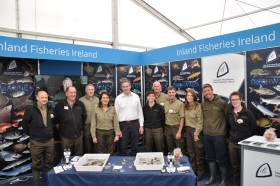Displaying items by tag: Lough Lene
Public Consultation on Trout Bag Limit and Size Limit for Lough Lene
Inland Fisheries Ireland (IFI) is seeking submissions from interested parties in respect of a proposed new angling bye-law which would set a minimum length and bag limit for trout caught and retained from Lough Lene.
At present there is no minimum length size for any trout caught and retained by rod and line on Lough Lene in Collinstown, Co Westmeath — nor is there any bag limit for trout.
The draft bye-law aims to assist with the sustainable management of the fishery by limiting the numbers of trout, of all sizes, being taken from the lake.
It aims to set a minimum length of 36cm (14 inches) a bag limit of not more than two per day for trout caught and retained on the waters of Lough Lene.
All submissions must be received in writing. Please be aware that all submissions received by IFI will be published on its website.
In addition, IFI is subject to the provisions of the Freedom of Information Act 1997 and therefore has to consider any request made to it under that act.
If you consider that any part of your submission would be subject to any of the statutory exclusions under that act, this should be indicated in your submission, specifying under which exemption you believe the content should be excluded.
IFI will make every effort to comply fully with the Data Protection (Amendment) Act 2003 and the EU Data Protection Directive 95/46/EC
Submissions should be clearly marked ‘ERBD Byelaw Consultation’ and sent by post to the Director, Inland Fisheries Ireland Dublin, 3044 Lake Drive, Citywest, Dublin 24 or alternatively by email to [email protected].
The public consultation period opened earlier this week and the closing date for receipt of submissions is 5pm on Tuesday 22 February.
New Angling Bye-Laws For Lough Muckno, Lough Lene & River Vartry
#Angling - Three new angling bye-laws have been introduced in the Eastern River Basin District by Minister of State with responsibility for Inland Fisheries, Sean Kyne.
Conservation of Coarse Fish and Pike Dundalk District (Lough Muckno) Bye-law No 950, 2017 has been introduced for Lough Muckno, near Castleblaney in Co Monaghan.
This bye-law provides for catch and release for all coarse fish and pike on the lough. Anglers must use keep nets to hold any coarse fish or pike and all fish are to be subsequently released.
The regulations apply to Lough Muckno including Gas Lake and the waters up to Derrygreevy Bridge, the tributary up to Frankfort Bridge, County Water up to Wallace’s Bridge and the Clarebane River up to Clarebane Bridge.
On Lough Lene in Collinstown, Co Westmeath, the Annual Close Season Bye-law No 322, 2017 now applies.
This new bye-law has extended the open season such that anglers fishing for brown trout or rainbow trout can now fish from 1 March until 12 October.
On the River Vartry in Co Wicklow, the River Vartry System (Conservation Bag Limit) Bye-law No 952, 2017 has been introduced.
An angler is now permitted to take one sea trout (40cm or less) per day from the river during the open season, which runs from 1 March to 30 September. The River Vartry is closed for fishing for salmon and sea trout over 40cm.
All three bye-laws came into effect on 1 October 2017.
Inland Fisheries Ireland’s Dublin director Brian Beckett said: “These new bye-laws are designed to protect and conserve a range of fish species while supporting important angling amenity activities within the Eastern River Basin District.
“These fish populations are valuable from a number of perspectives including biological diversity and angling amenity and Inland Fisheries Ireland hope that these measures serve to reinforce the importance of protecting and conserving all our fisheries in the future.”
























































